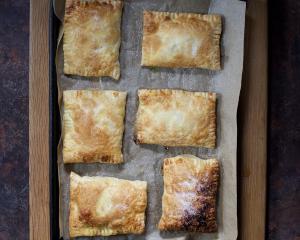Wine competition results are big news - for the wineries that win trophies, medals or recommendations.
At least it seems to be from the number of excited press releases we receive from wineries about their awards, sometimes exaggerated to say it means their wine is among the best in the world.
Sorry, but what are generally regarded as among the best wines in the world, such as first-growth Bordeaux or grand cru Burgundies, just don't enter competitions.
They don't need to because people are happy to pay several hundred dollars a bottle for them. It's the same in New Zealand wine shows; few of the top producers enter their wine.
The results of the British-based Decanter World Wine Awards, organised by Decanter magazine, are now out and the thousands of winners, including regional trophies, gold, silver and bronze medals and commendations (about half the 10,000-odd entries), can be searched for on www.decanter.com/worldwineawards/2009/results.php.
The results of the International Wine Challenge, a similar UK- based competition (with about 9000 entries) organised by Wine and Spirit magazine can be found on www.internationalwinechallenge.com.
Wine competitions are organised by magazines, supermarkets, distributors, and winemaker and winegrower organisations. Several are held annually in the UK, US, and in Australia (every wine-producing state there has one), and several are also held in New Zealand.
Wine competitions are marketing tools for those who win something, and money-earners for those who run them, and in some cases, for those who judge them. Entrants have to pay substantial entry fees and the organisers also sell stickers to those winners who want to add a gold or silver disk to their labels to attract buyers.
Those who look carefully (and somewhat cynically) at the results will often find a wine that wins a gold or silver in one show may well go bronze or nothing in another. Because wine tasting and judging are not exact sciences (despite the scores and medals) wine-show results are not reproducible.
However, from a producer's point of view, winning an award can be a good start for a new label, and an excited press release may well prompt a story in a newspaper on a quiet news day. At least the wine stands a chance of getting some notice among the thousands of others vying for distributors' attention or shelf or wine-list space.
Of the four gold medals awarded to New Zealand wines in the Decanter World Wine Awards, one was from Central Otago: Bald Hills Single Vineyard Pinot Noir 2007 (which received a bronze in the International Wine Challenge).
Of the 19 gold medals awarded to New Zealand wines at the International Wine Challenge, four were from Central Otago: Peregrine Pinot Noir 2007, Domain Road Pinot Noir 2007 (which took a bronze in the Decanter competition), Sandihurst Pinot Noir 2007 and Hinton Estate Vineyard Barrel Selection Pinot Noir 2007.
NZ bucking trend
Latest news from Decanter magazine, the organiser of one of these recent competitions, says New Zealand is bucking the trend of declining wine sales in the UK, according to the latest figures from AC Nielsen, whereas European countries such as France, Spain and Italy are suffering with the strength of the euro and the economic climate.
It has probably something to do with exchange rates and a large 2008 New Zealand vintage. Sauvignon blanc accounts for more than 75% of our wine exports. No doubt recent competition results will support this.












